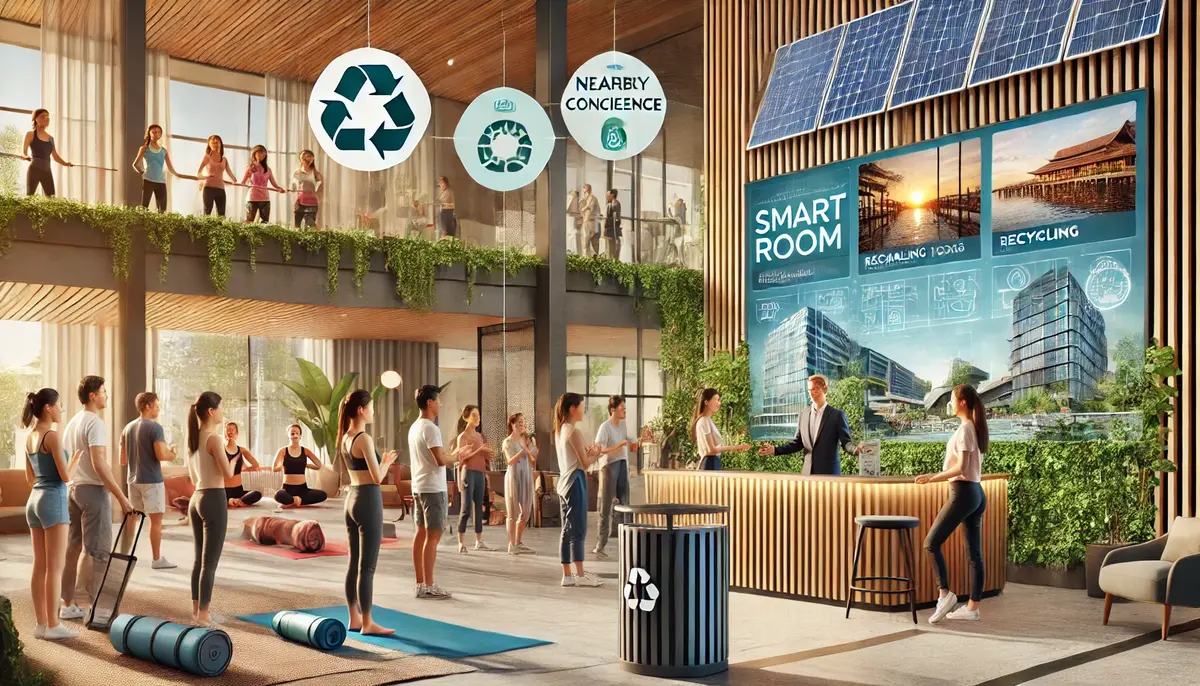The hospitality and tourism industry has always been a dynamic and ever-evolving sector, but the last few years have accelerated changes that were once only on the horizon. As we step into 2024, the industry is witnessing a transformation fueled by shifting consumer preferences, technological advancements, and a heightened focus on sustainability.
For businesses operating in this space, understanding these trends is not just an option—it’s a necessity to remain competitive and meet the expectations of modern travelers.
The Emergence of Experiential Travel
Gone are the days when travelers were satisfied with just a comfortable bed and a hearty breakfast. Today, the demand is for experiences that go beyond the ordinary, offering something unique and immersive. Experiential travel has emerged as a powerful trend, with travelers seeking to connect deeply with the culture, history, and people of their destinations.
Hotels and tourism operators are responding by offering more than just lodging—they are creating experiences. This can range from curated city tours led by local experts to hands-on workshops where guests can learn traditional crafts or cooking techniques.
For example, boutique hotels may partner with local artisans to offer guests a chance to create their souvenirs, or with chefs to host intimate cooking classes that explore regional cuisine.
This trend is also driving the popularity of unique accommodations such as treehouses, yurts, and glamping sites, which provide not just a place to stay but an experience in themselves.
These accommodations often emphasize local culture and environmental sustainability, further enhancing their appeal to modern travelers who are looking for something out of the ordinary.
Health and Wellness-Centric Travel
The global pandemic has brought health and wellness to the forefront of everyone’s mind, and this is especially true in the world of travel. The wellness tourism market is booming, with travelers increasingly seeking out destinations that offer opportunities to focus on their physical and mental well-being. This trend is reflected in the growing number of hotels and resorts that are expanding their wellness offerings.
Today’s travelers expect more than just a spa or gym; they are looking for comprehensive wellness experiences. This might include yoga and meditation sessions, personalized fitness programs, or even wellness retreats that focus on specific health goals such as detoxification or stress relief. Healthy dining options are also a must, with many hotels now offering menus that feature organic, locally sourced ingredients designed to nourish the body and soul.
Moreover, wellness tourism is evolving to include not just physical health but also mental and emotional well-being. Many resorts now offer holistic wellness programs that incorporate mindfulness practices, stress management techniques, and even digital detoxes to help guests unwind and rejuvenate. This holistic approach to wellness is becoming a key differentiator for hospitality brands looking to attract health-conscious travelers.
Sustainability: A Core Value in Hospitality
As environmental awareness grows, sustainability has become a core value in the hospitality industry. Today’s travelers are not just looking for luxury; they want to know that their choices are not harming the planet. This has led to a significant shift in how hotels and resorts operate, with many adopting eco-friendly practices as a key component of their brand identity.
Sustainable hospitality practices can take many forms, from reducing single-use plastics and minimizing water waste to implementing energy-efficient systems and sourcing food from local, organic farms. Some hotels are even going a step further by integrating sustainability into their guest experiences, offering eco-tours, conservation projects, or opportunities for guests to participate in local environmental initiatives.
In addition to these operational changes, sustainability is increasingly being woven into the marketing strategies of hospitality brands. By highlighting their commitment to the environment, these brands can attract eco-conscious travelers who are willing to pay a premium for sustainable options. This shift not only helps protect the planet but also builds stronger, more loyal relationships with guests who share these values.
Personalization Through AI and Big Data
In today’s digital age, personalization has become a key expectation for consumers, and the hospitality industry is no exception. Thanks to advancements in AI and big data analytics, hotels and resorts are now able to offer highly personalized experiences that cater to the unique preferences of each guest.
AI-driven personalization can take many forms, from recommending activities and dining options based on a guest’s past behavior to customizing room settings like temperature and lighting to match their preferences. Some hotels are even using AI to anticipate guest needs before they arise, ensuring that every aspect of their stay is tailored to their tastes.
This level of personalization not only enhances the guest experience but also helps build loyalty by making guests feel valued and understood. As AI technology continues to evolve, the potential for even more sophisticated personalization in hospitality is vast, making it an essential area of focus for forward-thinking businesses in the industry.
The Growth of Bleisure Travel
The concept of “bleisure” travel—a blend of business and leisure—is not new, but it has gained significant momentum in recent years, particularly in the wake of the global shift towards remote work. As more professionals find themselves able to work from anywhere, the lines between business and leisure travel are blurring, leading to a rise in trips that combine both.
For the hospitality industry, this trend presents both challenges and opportunities. On the one hand, it requires hotels to adapt their offerings to meet the needs of remote workers, providing amenities like high-speed internet, co-working spaces, and meeting rooms. On the other hand, it opens up new possibilities for attracting longer stays and higher-spending guests, who are looking to combine work with leisure activities.
Many hotels are now offering specialized packages designed specifically for bleisure travelers, which might include extended stay discounts, access to business facilities, and curated leisure experiences. By catering to this growing segment of the market, hotels can tap into a lucrative and expanding audience of professionals who value flexibility and the ability to balance work with relaxation.
Technology Integration: Enhancing the Guest Experience
Technology has always played a role in the hospitality industry, but its importance has only grown in recent years. In 2024, technology integration is not just about convenience—it’s about creating seamless, memorable experiences that enhance every aspect of a guest’s stay.
One of the most significant technological trends in hospitality is the rise of contactless services, driven by the need for safety and hygiene in a post-pandemic world. From mobile check-ins and digital room keys to QR code menus and contactless payments, these technologies are becoming standard in hotels and resorts around the world. They offer guests a more convenient, hassle-free experience while also reducing the need for physical contact, which has become a priority for many travelers.
In addition to contactless services, the Internet of Things (IoT) is transforming the way hotels operate. Smart rooms, which allow guests to control everything from lighting and temperature to entertainment systems using their smartphones, are becoming increasingly popular. These innovations not only enhance the guest experience but also enable hotels to operate more efficiently, using data to optimize energy usage and reduce costs【9†source】.
Emerging Tourism Trends: A Glimpse into the Future
The tourism industry is no stranger to change, and 2024 is set to be a year of exciting new developments. From the rise of cultural and eco-tourism to the growing interest in virtual and augmented reality experiences, the future of tourism is full of possibilities.
Cultural tourism, which focuses on connecting travelers with the local traditions, history, and culture of their destinations, is becoming increasingly popular. This trend is driven by a desire for authenticity and a deeper understanding of the places people visit. Travelers are no longer content with just seeing the sights—they want to immerse themselves in the local way of life, whether that means participating in traditional ceremonies, learning about the history of the area, or trying their hand at local crafts.
At the same time, advancements in technology are opening up new tourism opportunities. Virtual and augmented reality experiences are being used to enhance visitor experiences, both before and during their trips. From virtual tours of historical sites to augmented reality guides that provide real-time information about the places they are visiting, these technologies are changing the way people explore the world.
One of the most futuristic trends in tourism is the emergence of space tourism. While still in its early stages, space tourism offers a unique and unprecedented experience for those looking to venture beyond Earth. As technology continues to advance and the cost of space travel decreases, this once-unimaginable form of tourism is becoming a reality, offering a glimpse into the future of travel.
Strategic Partnerships and Talent Development: Building a Stronger Industry
As the hospitality and tourism industry continues to evolve, the need for skilled talent has never been greater. To meet this demand, many businesses are forming strategic partnerships with global recruitment agencies, educational institutions, and vocational training programs. These partnerships are essential for attracting and developing the talent needed to deliver exceptional guest experiences and drive industry growth.
Local talent development is also becoming a priority, with many regions investing in programs that nurture homegrown talent. By collaborating with local schools, universities, and training organizations, hospitality businesses can build a strong talent pipeline that is equipped to meet the challenges of a rapidly changing industry.
In addition to attracting new talent, retaining skilled employees is crucial for long-term success. To this end, many hospitality businesses are focusing on improving the overall employee experience, offering competitive benefits, career development opportunities, and a positive work culture. Engaged and satisfied employees are more likely to deliver superior guest experiences, which in turn drives business success.
Conclusion
The hospitality and tourism industry is on the cusp of a new era, one that is defined by innovation, sustainability, and a deep understanding of the evolving needs of travelers. By staying ahead of these trends and embracing the opportunities they present, businesses in this sector can not only survive but thrive in a rapidly changing world. As we look to the future, the emphasis will be on creating experiences that resonate on a deeper level with guests while also ensuring the sustainability and longevity of the business.
FAQs
What are the key trends in hospitality and tourism for 2024?
The key trends include the rise of experiential travel, a focus on health and wellness, sustainability as a core value, personalization through AI, the growth of bleisure travel, and the increasing integration of technology.
How can hotels incorporate experiential travel into their offerings?
Hotels can incorporate experiential travel by partnering with local businesses to offer unique, culture-driven experiences such as city tours, workshops, and local craft-making sessions. Emphasizing authentic, immersive experiences will attract travelers seeking more than just a place to stay.
Why is sustainability important in hospitality, and how can it be implemented?
Sustainability is important because it aligns with the growing environmental awareness among consumers, who prefer to support eco-friendly businesses. Hotels can implement sustainability by reducing waste, using energy-efficient systems, sourcing local and organic food, and promoting eco-friendly guest experiences.
How is AI and technology reshaping the hospitality experience?
AI and technology are reshaping the hospitality experience by enabling personalized guest services, contactless interactions, and smart room features. These innovations enhance guest satisfaction by catering to individual preferences and providing a seamless, tech-enabled stay.








